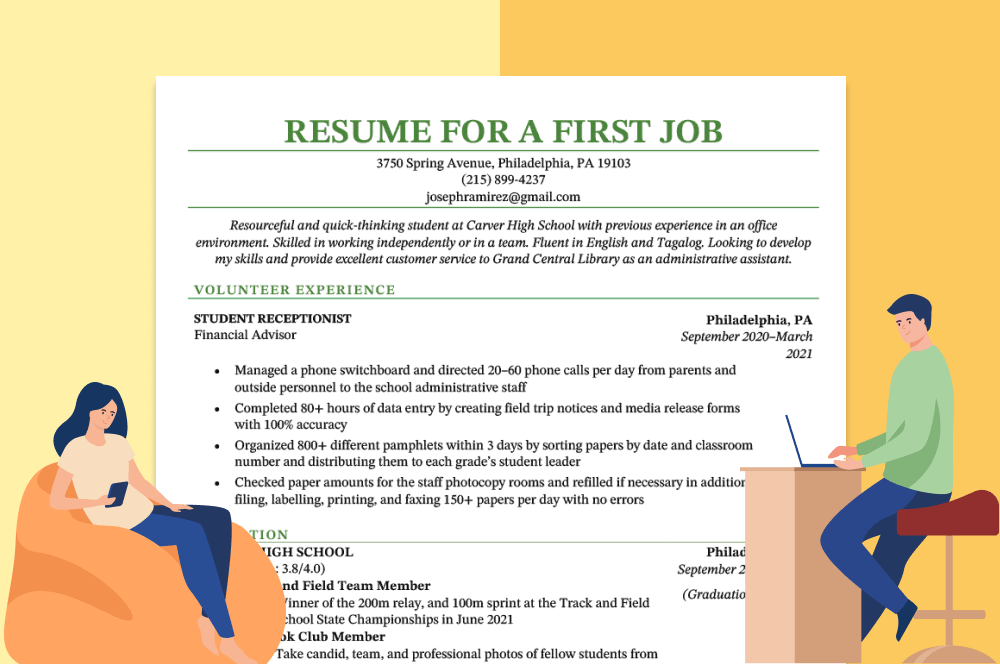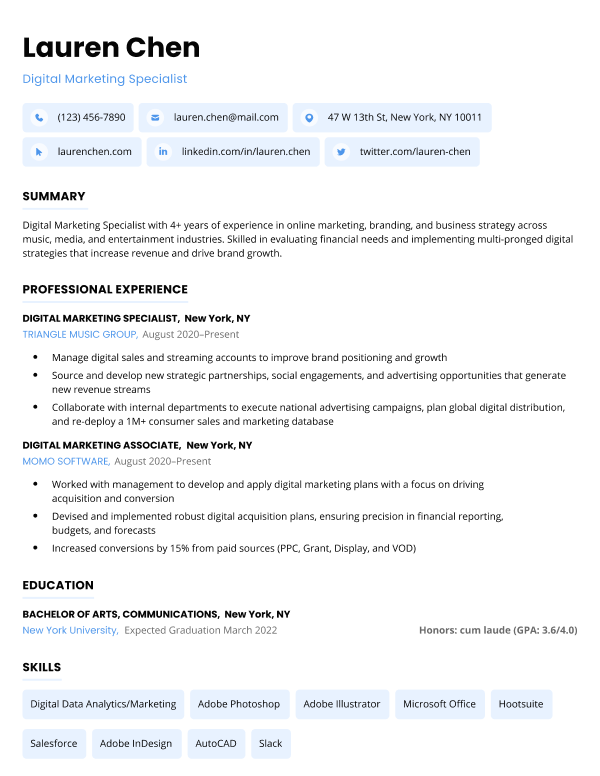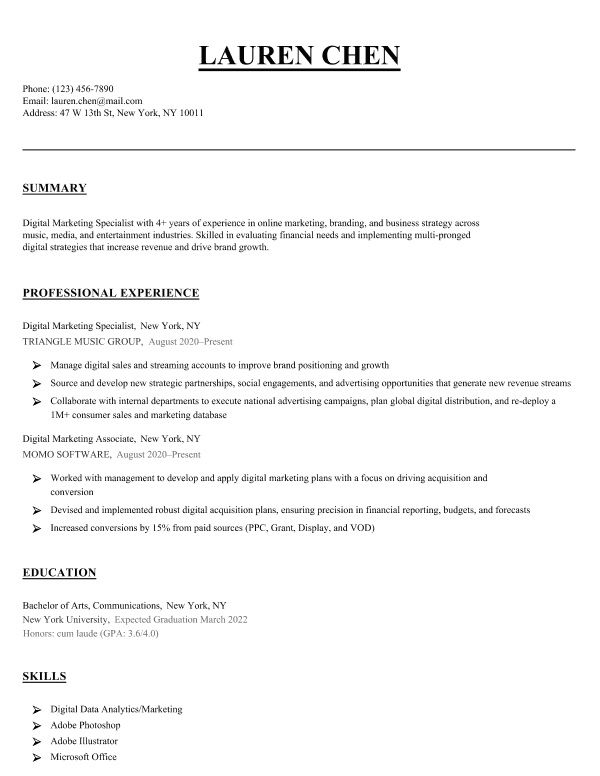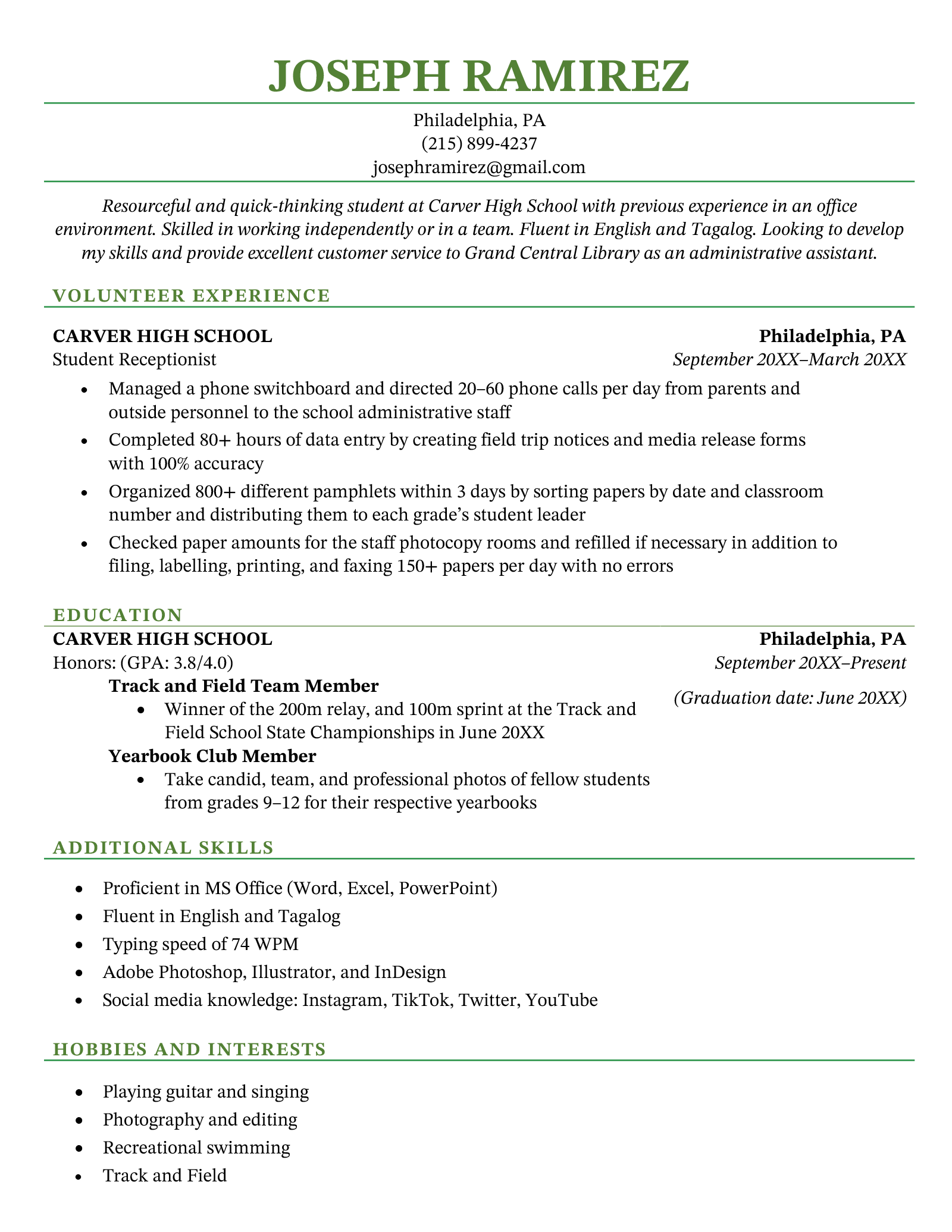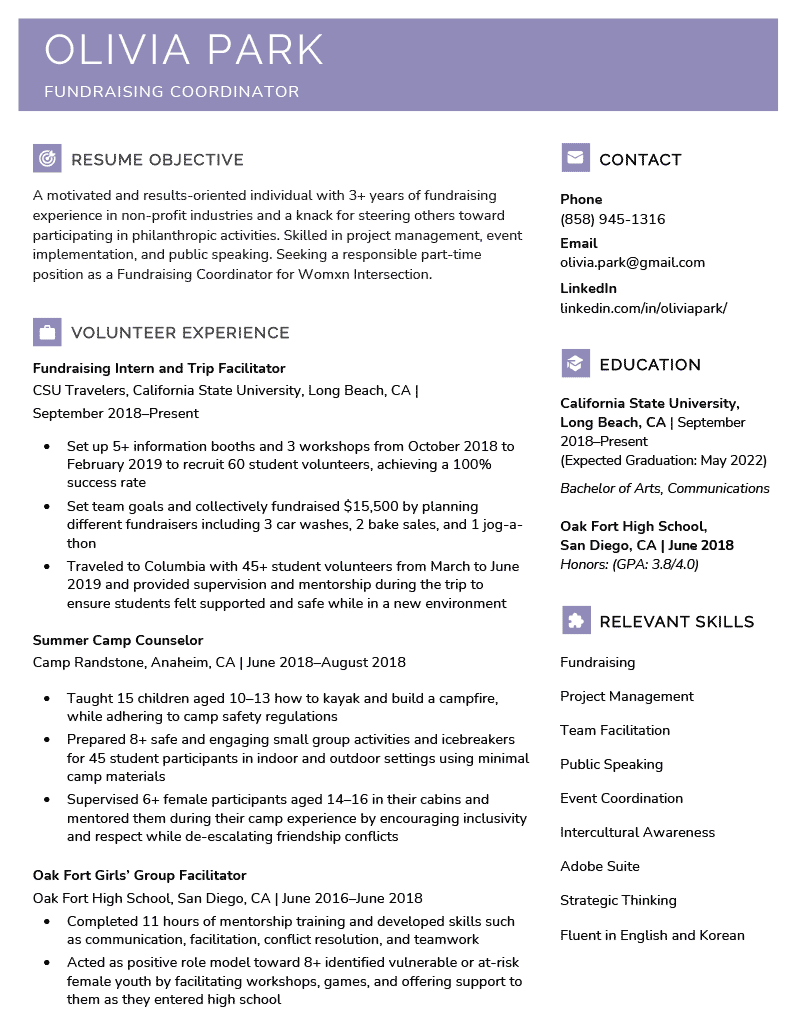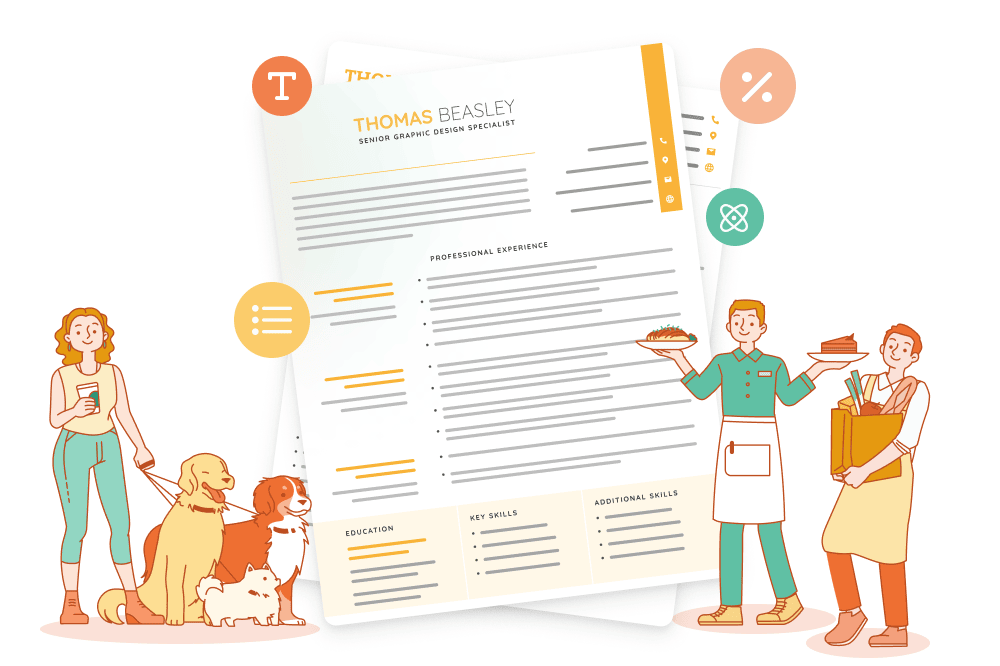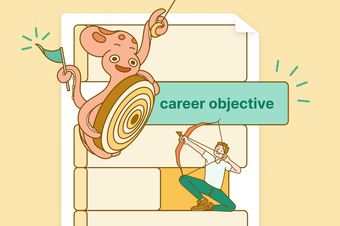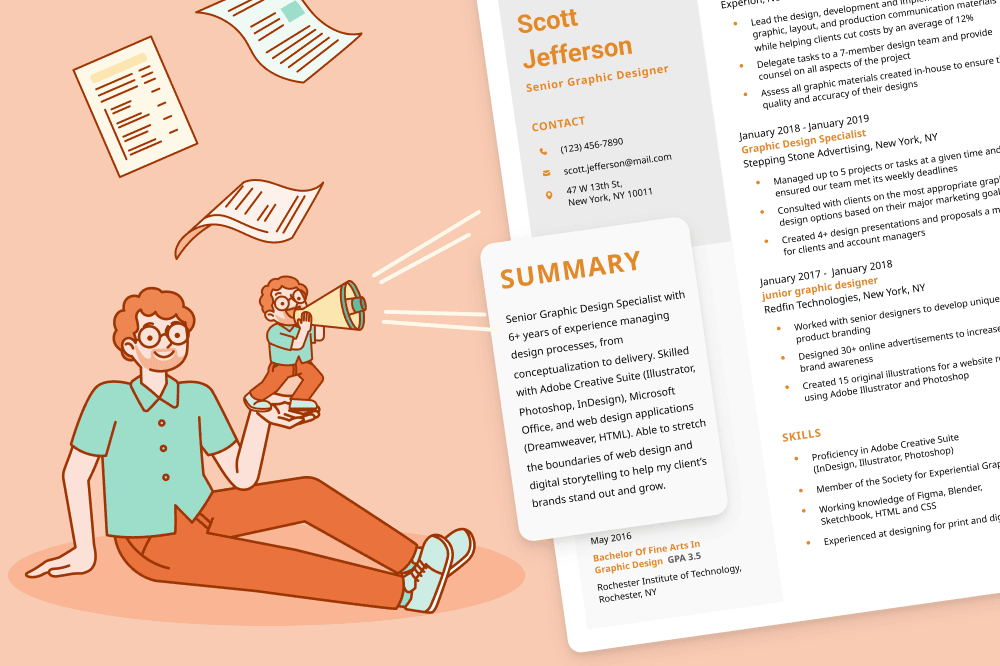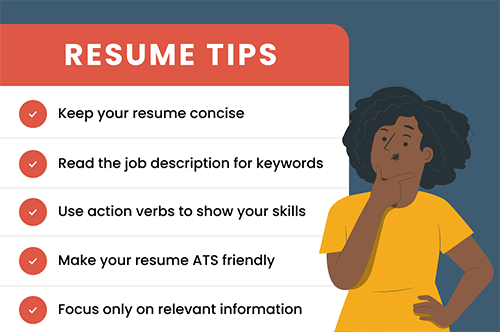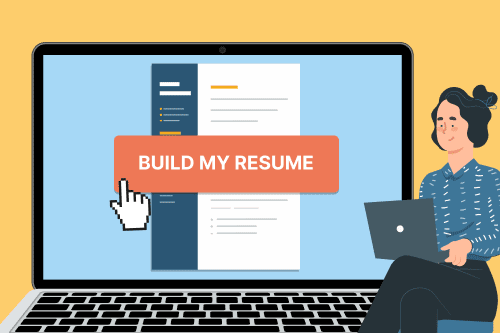Getting your first job is an exciting milestone, but what if you’re applying without formal work experience? Don’t worry. Writing a great resume is easier than you think.
In this video, our resident career expert Chloe takes you through writing a resume with no experience:
No matter your background, we’ll show you how to properly highlight your skills and related experience and give you some great examples to model your resume after. Our free-to-use resume builder can make you a resume in as little as 5 minutes. Just pick the template you want, and our software will format everything for you.
1. Draw inspiration from resume examples for your first job
The easiest way to learn how to make a good resume for your first job is by looking at some resume samples written by candidates who’ve been in a similar situation.
Below are two student resume examples to give you some ideas of how to fill your resume even if you don’t have work experience:
High school student resume example
If you’re a high school student making a resume for the first time, have a look at this resume example to help you write yours:
First Job Resume Sample | High School Student (Text)
RESUME OBJECTIVE
Resourceful and quick-thinking student at Carver High School with previous experience in an office environment. Skilled in working independently or in a team. Fluent in English and Tagalog. Looking to develop my skills and provide excellent customer service to Grand Central Library as an administrative assistant.
VOLUNTEER EXPERIENCE
Student Receptionist
Carver High School / Philadelphia, PA / September 2020–March 2021
- Managed a phone switchboard and directed 20–60 phone calls per day from parents and outside personnel to the school administrative staff
- Completed 80+ hours of data entry by creating field trip notices and media release forms with 100% accuracy
- Organized 800+ different pamphlets within 3 days by sorting papers by date and classroom number and distributing them to each grade’s student leader
- Checked paper amounts for the staff photocopy rooms and refilled if necessary in addition to filing, labeling, printing, and faxing 150+ papers per day with no errors
EDUCATION
Carver High School
Honors: (GPA: 3.8/4.0)
Philadelphia, PA / September 2019–Present (Graduation date: June 2023)
Track and Field Team Member
- Winner of the 200m relay, and 100m sprint at the Track and Field School State Championships in June 2021
Yearbook Club Member
- Take candid, team, and professional photos of fellow students from grades 9–12 for their respective yearbooks
ADDITIONAL SKILLS
- Proficient in MS Office (Word, Excel, PowerPoint)
- Fluent in English and Tagalog
- Typing speed of 74 WPM
- Adobe Photoshop, Illustrator, and InDesign
- Social media knowledge: Instagram, TikTok, Twitter, YouTube
HOBBIES AND INTERESTS
- Playing guitar and singing
- Photography and editing
- Recreational swimming
- Track and Field
College student resume example
Whether you’re currently in college or a recent graduate, this resume example for a college student is here to guide you toward finding your first job:
First Job Resume Sample | College Student (Text)
RESUME OBJECTIVE
A motivated and results-oriented individual with 3+ years of fundraising experience in non-profit industries and a knack for steering others toward participating in philanthropic activities. Skilled in project management, event implementation, and public speaking. Seeking a responsible part-time position as a Fundraising Coordinator for Womxn Intersection.
VOLUNTEER EXPERIENCE
Fundraising Intern and Trip Facilitator
CSU Travelers / California State University, Long Beach, CA / September 2018–Present
- Set up 5+ information booths and 3 workshops from October 2018 to February 2019 to recruit 60 student volunteers, achieving a 100% success rate
- Set team goals and collectively fundraised $15,500 by planning different fundraisers including 3 car washes, 2 bake sales, and 1 jog-a-thon
- Traveled to Columbia with 45+ student volunteers from March to June 2019 and provided supervision and mentorship during the trip to ensure students felt supported and safe while in a new environment
Summer Camp Counselor
Camp Randstone / Anaheim, CA / June 2018–August 2018
- Taught 15 children aged 10–13 how to kayak and build a campfire, while adhering to camp safety regulations
- Prepared 8+ safe and engaging small group activities and icebreakers for 45 student participants in indoor and outdoor settings using minimal camp materials
- Supervised 6+ female participants aged 14–16 in their cabins and mentored them during their camp experience by encouraging inclusivity and respect while de-escalating friendship conflicts
Oak Fort Girls’ Group Facilitator
Oak Fort High School / San Diego, CA / June 2016–June 2018
- Completed 11 hours of mentorship training and developed skills such as communication, facilitation, conflict resolution, and teamwork
- Acted as positive role model toward 8+ identified vulnerable or at-risk female youth by facilitating workshops, games, and offering support to them as they entered high school
EDUCATION
California State University
Long Beach, CA / September 2018–Present
(Expected Graduation: May 2022)
Bachelor of Arts, Communications
RELEVANT SKILLS
- Fundraising
- Project management
- Team facilitation
- Public speaking
- Event coordination
- Intercultural awareness
- Adobe Suite
- Strategic thinking
- Fluent in English and Korean
2. Make a professional resume header
Your resume header lets employers easily find your name and essential contact details so they can reach you if they’re interested in interviewing you.
A standard resume header should:
- feature your first and last name clearly (in a bigger size than the rest of your resume’s text)
- list your contact information (email and phone number)
- sit at the top of your resume — in the center or aligned to the left side of the page
If you have LinkedIn, Twitter, or a portfolio, consider adding them to your resume header. Including your professional profiles shows employers your additional interests and professional network.
To ensure that employers only see your professional side, don’t link any personal profiles that are unrelated to the job or industry you’re applying for.
3. Begin with a clear resume objective
Starting your resume with a tailored resume objective helps you introduce yourself briefly to a hiring manager by telling them your career goals and why you’re a great fit for the position.
In 2–4 sentences, your resume objective should state the role you’re applying for and highlight your most relevant:
- skills
- experience
- education or training
- achievements
Keep in mind, the relevant experience can be something you accomplished at school or elsewhere in your life — as long as it relates in some way to the job.
This is an example of a high school student’s resume objective for their first job:
Resume objective for first job
High school honors student with 2+ years of volunteer experience. Aiming to use acquired interpersonal and problem solving abilities to effectively fill your retail position at Cotton On. A quick learner looking to fulfill the company mission and grow in the role as fast as possible.
4. Use a well-organized resume template
Writing your first resume is much easier when you don’t have to worry about resume formatting requirements like alignment, margins, and resume-appropriate fonts.
Your best bet is to use a clean and well-organized resume template designed to feature your skills and accomplishments in a way that’s easy for hiring managers to scan.
To make the best possible first impression, find a template you like that’s both eye catching and professional. Also be sure to double check your resume for typos and grammatical errors so employers know you have excellent attention to detail.

The best format for your resume
Learn how to pick a resume format that highlights your strengths and downplays your weaknesses by reading our HR-approved guide.
5. Mention your hard and soft skills
When writing a resume for your first job, think about skills you picked up from classes, projects, clubs, and sports. Then place the most relevant skills in your resume’s skills section.
Soft skills are personality traits that are valued in the workplace. Things like people skills, critical thinking skills, and public speaking are all useful soft skills that can help you get your first job.
Hard skills are things you learned from experience or in school. For instance, computer skills like Photoshop or Microsoft Word count as hard skills.
If you’re using the standard chronological resume format, you can use a simple bulleted list to feature your key skills.
6. Emphasize your education and coursework
When writing a resume for your first job, don’t neglect your resume education section. Here are some achievements you can highlight from school:
- academic accomplishments
- special projects
- certifications
- coursework
- publications
Even if you’re writing a resume as a college freshman, you can list a few classes you’ve taken if they relate to the job you’re applying for. For example, mention in your resume that you took an advanced computer science course if you’re applying for a job in IT.
By putting relevant coursework on your resume, you prove you have educational experience in the field you want to join. It’s possible you even picked up hard skills that can apply to your first job.
Also add any awards and honors you have to show you’re highly skilled, ambitious, and active in your community.
Finally, you can consider whether to list your GPA on your resume. A strong GPA (3.5 or higher) is good. If your grades aren’t great, then leave your GPA off.
7. Include relevant experience
Internships, volunteer work, and extracurricular activities are great additions to your first resume. Just make sure the experiences you choose to highlight are relevant to the job you want.
Internships
Including an internship on your resume is great because it:
- proves you can work in a professional environment
- represents practical experience in your chosen career
- allows you to easily highlight major projects or assignments
Make sure you list the company name and location, your title, the duration (starting and ending month and year), and a few bullet points about what you accomplished during your internship.
Volunteer Work
You can also add volunteer work to your resume. Volunteering shows you’ve gained some valuable practical experience and gives you extra talking points during an interview.
Even if your volunteer experience isn’t related to the position, many of the skills you develop are transferable to other careers, such as communication, organization, and time management.
Extracurricular Activities
Additionally, consider enhancing your resume with extracurricular activities like sports or clubs. Extracurricular activities give your employers an impression of who you are and how you spend your time.
Highlighting extracurriculars is most appropriate if you’re writing a teen resume or an entry-level resume, as they are likely to be some of the only experiences you have.
Extracurricular activities can help you showcase even more of your top skills. For instance, if you held a leadership position in any clubs or sports, you could add leadership skills to your skills section.
8. Use a resume builder
If writing your resume for your first role still seems difficult, or if you’re short on time, consider using an AI resume builder.
A resume builder is a tool that helps you make a resume in a few minutes by asking you questions about your educational background, previous experience, and notable skills.
You’ll end up with a professionally formatted, up-to-date resume that accurately reflects the needs of the industry you’re applying for.

Emily Crowley
Career Advisor & Senior Content Writer
Emily Crowley loves helping job seekers overcome obstacles to advance their careers. She graduated from George Mason University with a degree in Foreign Language and Culture and relocated to Taipei shortly after. As a writer and career advisor, she takes a particular interest in empowering young professionals through practical knowledge and advice on topics like resume writing, interviewing, and navigating career changes. Emily’s career advice has been featured in online publications such as Global Trade Magazine and Parade. For media-related queries, she can be reached at emily [at] resumegenius [dot] com.
View Emily's ProfileClick to rate this article
4.1 Average rating


